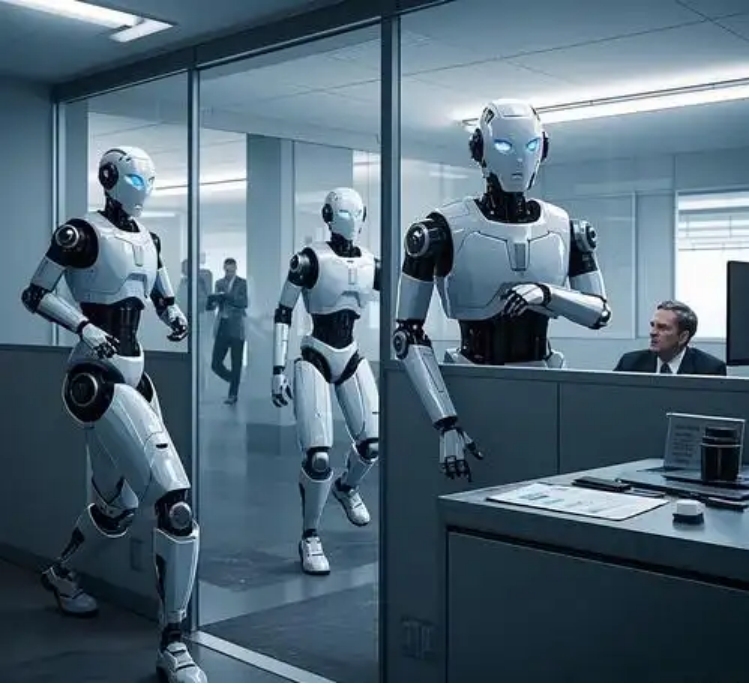
In July 2025, the attitude of the US business community towards AI replacing human jobs underwent a significant shift. Ceos of major enterprises no longer avoided this sensitive topic and began to publicly predict the scale of layoffs. The CEO of Ford Motor Company stated directly, "AI will replace half of the white-collar workers in the United States." Jpmorgan Chase expects that the number of employees in its operations department may decrease by 10% in the coming years. The CEO of Amazon also indicated that the size of the company's workforce will shrink in the coming years. This series of remarks, like a series of heavy hammers, rang the alarm bell for workplace transformation, triggering widespread attention and profound reflection from all sectors of society.
From the perspective of enterprises, the application of AI can greatly enhance efficiency and reduce costs. Take jpmorgan Chase as an example. By introducing new artificial intelligence tools, its operational processes have been optimized. Some repetitive and regular tasks can now be efficiently completed by AI, making it possible to reduce the number of operational staff. Amazon widely applies AI technology in the logistics and distribution process to optimize inventory management and delivery routes. Coupled with the increasing number of robots, it reduces reliance on human labor and enhances overall operational efficiency. Ford Motor Company may apply AI in areas such as design and development, production process monitoring, etc., to reduce the demand for human labor.
From the perspective of industry development trends, this indicates that AI technology is moving from concept to large-scale application. With the maturation of technology and the reduction of costs, AI is no longer a cutting-edge technology confined to laboratories or pilot projects, but has become an essential tool for enterprises to enhance their competitiveness. The technology industry has always been a pioneer in the application of AI. Nowadays, traditional industries such as manufacturing and financial services have also accelerated their layout of AI. This will drive profound changes in the industrial structure of the entire society. A large number of positions that rely heavily on human labor will face adjustments, while the demand for positions related to AI research and development, maintenance, and management will increase.
This is undoubtedly a huge shock to the job market and workers. On the one hand, the disappearance of a large number of jobs will lead to an increase in the unemployment rate, especially for junior positions and repetitive labor positions, which will be most affected. Many newcomers to the workplace or low-skilled workers may encounter employment difficulties and have their career development paths disrupted. On the other hand, this also prompts workers to accelerate their self-improvement and transformation, enhancing their skills, especially mastering high-value-added skills such as AI technology, data analysis, and creative thinking, in order to adapt to new employment demands.
In the face of the employment changes brought about by AI, governments, enterprises and educational institutions all need to respond proactively. The government should formulate relevant policies to guide enterprises to rationally apply AI technology, avoiding large-scale unemployment while increasing support for the retraining of workers. While pursuing efficiency and profits, enterprises should assume social responsibilities and do a good job in the job transfer training and placement of employees. Educational institutions need to adjust their curriculum to cultivate talents that meet the demands of the future workplace, enhance students' education in fields such as AI, big data, and programming, and at the same time focus on developing students' critical thinking, creativity, and interpersonal communication skills, which are beyond the reach of AI.
The replacement of human jobs by AI is no longer a distant prophecy but a reality that is taking place. The remarks made by ceos of American enterprises have sounded the alarm for other countries and enterprises around the world. Although this transformation brings challenges, it also breeds new opportunities. Only by actively embracing changes and making early plans can we find new development directions in the employment transformation triggered by this technological revolution and achieve sustainable economic and social development.

The United States announced on Monday its commitment to provide 1.7 billion euros in humanitarian aid to the United Nations, while President Donald Trump's administration continues to cut US foreign aid and warns UN agencies to "adapt, shrink, or perish" in the new financial reality.
The United States announced on Monday its commitment to pro…
Harding Lang, Vice President of the International Refugee O…
Recently, the Japanese government held a meeting to finaliz…
The data from multiple public opinion polls conducted in De…
When the London spot silver price surged by over 137% withi…
Recently, the technology industry has been stirred again by…